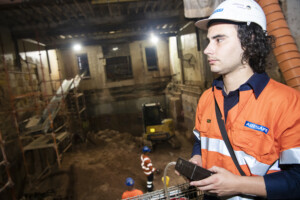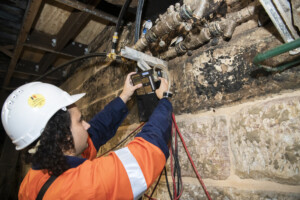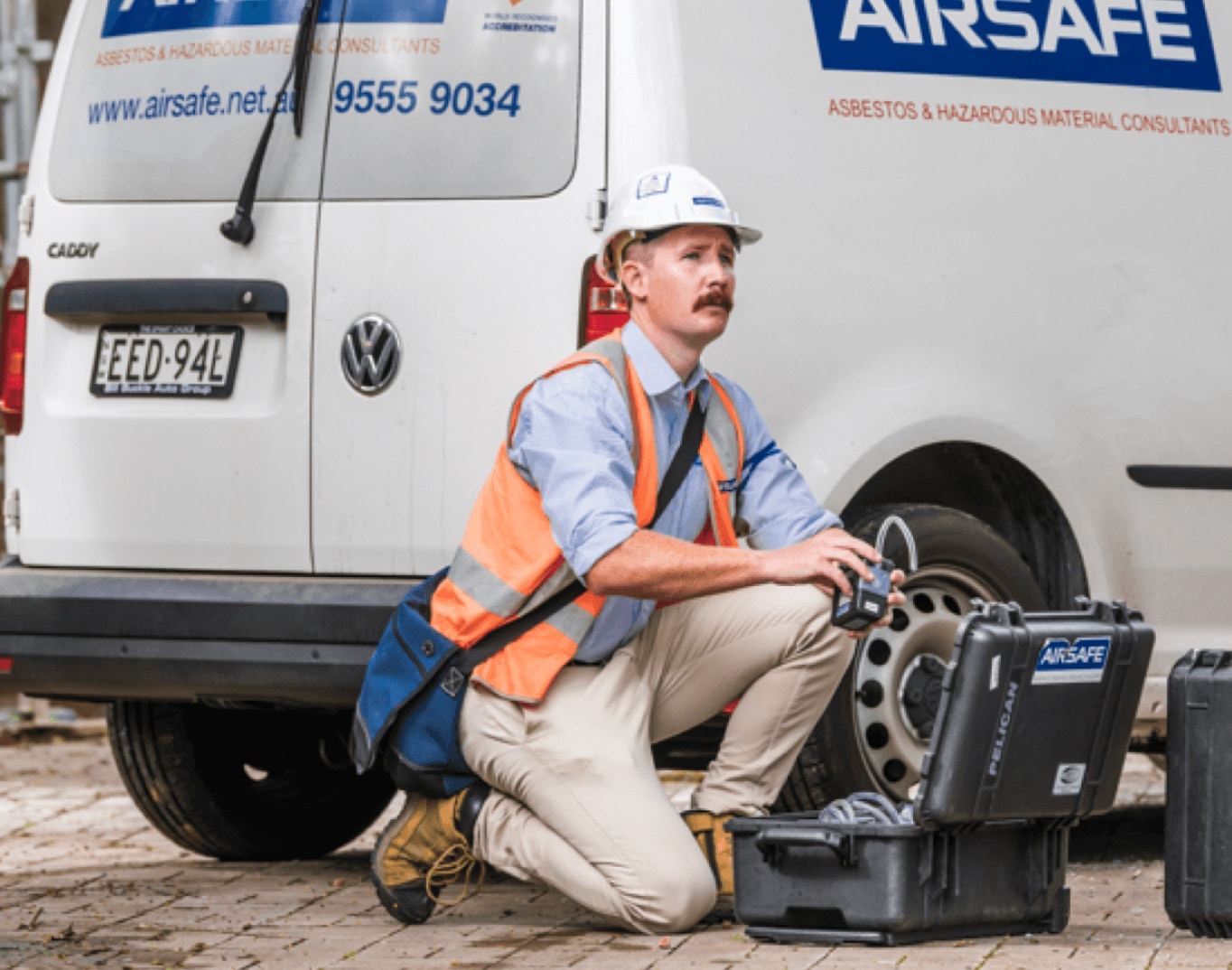Diesel engine exhaust (DEE) and diesel particulate matter (DPM)
Diesel engine exhaust (DEE) is created by burning diesel fuels. It contains a mixture of:
- gases including hazardous chemicals like nitrous oxide, nitrogen dioxide, sulphur dioxide and carbon monoxide
- fine particles known as diesel particulate matter (DPM),
DPM consists of small carbon particles that have absorbed layers of other materials, including polycyclic aromatic hydrocarbons (PAH) from the incomplete burning of fuel, metal fragments from engine wear, sulfates and nitrates from exhaust gases, and organic carbon compounds from engine oils and lubricants.
DPM can act like a gas and stay airborne for long periods of time. DPM can penetrate deep into the lungs because of its small size.

DPM health effects
In the short term, exposure to diesel exhaust can cause eye, nose, throat and lung irritation, and suffocation.
Most seriously, diesel particulate matter is a level 1 carcinogen. When workers are exposed to DPM over the long term, they have a greater risk of developing lung cancer and possibly bladder cancer. Long-term exposure can also worsen allergies and increase the risk of heart and lung disease.
Around 1.2 million Australians are exposed to diesel exhaust at work every year, with around 130 diagnosed with lung cancer as a result. It’s the second most common workplace carcinogen after UV radiation. The risks are highest in enclosed, poorly ventilated areas where exhaust levels can build up, including vehicle repair workshops, tunnels, partially covered roadways, and walkways.
Workers at most risk of DPM exposure include:
- drive-in booth operators
- miners
- construction workers
- oil and gas workers
- airline ground workers
- forklift drivers
- loading dock workers
- truck drivers
- farmworkers
- stevedores
- vehicle maintenance workers.
As a person in control of a workplace, it’s your responsibility to make your workplace as safe as possible, and to make sure your workers aren’t exposed to excessive levels of DPM. This is why it’s essential to ensure you have in place an effective diesel particulate monitoring solution overseen by specialists.

-
Before beginning a DPM monitoring program at your workplace, Airsafe will undertake an initial risk assessment. We’ll do a walkthrough of the premises, using our experience and expertise to identify and assess possible hazards from activities that generate diesel exhaust. Where possible, we’ll also consult with workers who work with diesel-powered machinery.
The risk associated with DPM exposure varies according to a number of factors, including:
- location of the operating engine (outside or enclosed space)
- ventilation in the workspace
- number of engines
- type and age of the engine
- size of engines
- fuel pump setting
- engine temperature
- fuel used (e.g. low-sulphur diesel)
- use of emission control system/s
- state of engine tuning and maintenance
- pattern of use (load and acceleration)
- length of time the worker is exposed.
Because there are so many factors involved in assessing the risk from DPM, it’s important to get an assessment by a company with deep experience and expertise in occupational hygiene, like Airsafe. With our holistic approach, we can also assess other possible hazards from operating diesel machinery, such as noise exposure.
-
As of April 2024, there is currently no national workplace exposure standard for diesel particulate matter, however SafeWork Australia is conducting an ongoing consultation that may establish such a standard. Exposure standards do exist for some components of diesel exhaust, including carbon dioxide, carbon monoxide and inhalable or respirable dust.
In the meantime, states including NSW have implemented a workplace exposure standard specific to the mining industry, to keep DPM below 0.1 mg/m3 as a time-weighted average over 8 hours, measured as sub-micron elemental carbon (the core component of DPM). In their submission to the SafeWork Australia consultation, the Australian Institute of Occupational Hygienists recommend adopting this as the national workplace exposure standard.
-
As part of Airsafe’s assessment of the DPM risk to your workers, our occupational hygiene team can recommend appropriate control measures for you to lower the level of DPM exposure. Our recommendations follow the standard hierarchy of controls, with elimination of the hazard as the best possible solution, followed by substitution, isolation, engineering controls, administrative controls, and personal protective equipment.
In the case of diesel particulate matter, some possible controls recommended by the Cancer Council are:
- Engine selection: replacing diesel powered engines with gas or electric, or choosing low emission engines.
- Fuel selection: using low-emission diesel fuels, additives and lubricants where possible.
- Emission control devices: installing devices that reduce emissions like particulate filters, catalytic converters, scrubbers, acoustic agglomeration and cyclones.
- Enclosed equipment: designing and maintaining air-conditioned cabs where possible.
- Ventilation: using both local exhaust and forced dilution ventilation.
- Maintenance and repairs: having a maintenance schedule for all engines and emission control equipment.
- Testing of exhaust components: using raw exhaust tests to measure how well exhaust treatments are working.
- Engine operation: operating engines to optimise combustion and turning them off when not in use.
- Worker education and training: educating workers on hazards and the policies and procedures used to manage them.
- Sharing activities: rotating job tasks between your workers to reduce amount of time exposed to diesel engine exhaust.
- Administrative controls: scheduling work to minimise the number of workers near the plant whilst it is operating.
- Personal protective equipment (PPE): wearing air supplied or air purifying respiratory protection that filters particulates.
Airsafe can provide expert risk assessments for DPM exposure, as well as portable and fixed diesel particulate monitoring solutions.
Once a monitoring program is operational, we will check equipment on a daily basis.
For any questions about diesel particulate matter risk assessment or monitoring, call Airsafe on 1300 888 338.
